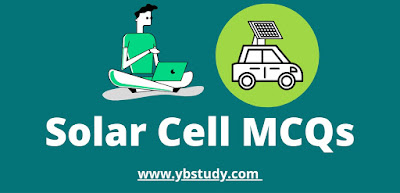Solar Cell MCQ | Download Pdf
Solar Cell MCQ | MCQs on Solar Cell for NEET
Solar cell: A solar cell is a p-n junction diode that transforms sunlight (solar energy) into electrical energy. It works on the principle of photovoltaic conversion. When solar radiations of energy hv >Eģ, (energy gap of the semiconductor), is incident on the p-n junction, they are absorbed by silicon (or Ge), and electron-hole pairs are formed and their flow through the load constitutes the current. Thus the illuminated p-n junction behaves like a battery.
P-I-N diode solar cell: To increase the width of the depletion region, a single crystal of intrinsic material is inserted between P and N extrinsic semiconductors. Thus a P-I (intrinsic) -N diode is formed. It is more efficient than the ordinary solar cell.
Solar Cell MCQs ( Solar cell questions with Answers)
1. The efficiency of a solar cell may be in the range of_________
(a) 2 to 5%
(b) 10 to 15%
(c) 30 to 40%
(d) 70 to 80%
Answer: B
2. A solar cell works on the principle of___________
(a) photoelectricity
(b) photographic camera
(c) photovoltaic conversions
(d) photosynthesis
Answer: C
3. The efficiency of the solar cell is about___________
(a) 25 %
(b) 15 %
(c) 40 %
(d) 60 %
Answer: B
4. A module in a solar panel refers to_______________.
(a) the series arrangement of solar cells.
(b) the parallel arrangement of solar cells.
(c) series and parallel arrangement of solar cells.
(d) None of the above
Answer: C
5. Solar cells are made of______
(a) silicon
(b) germanium
(c) Silver
(d) aluminum.
Answer: A
6. The solar or photo voltaic cell converts_________
(a) Chemical energy to electrical energy
(b) Solar radiation into electrical energy
(c) Solar radiation into thermal energy
(d) Thermal energy into electrical energy
Answer: B
7. Solar cells are made of:
(a) Aluminium
(b) Germanium arsenide
(c) Silicon
(d) Cadmium arsenide
Answer: C
8. A module is a__________
(a) Series-arrangement of solar cells
(b) Parallel arrangement of solar cells
(c) Series-parallel arrangement of solar cells
(d) None of the above
Answer: C
9. The most commonly used semiconducting material used to prepare a solar cell is_______
(a) Gallium arsenide
(b) Indium arsenide
(c) Cadmium arsenide
(d) Silicon
Answer : D
10. LEDS used for giving infrared radiations are prepared from_____
(a) Silicon dioxide
(b) Gallium arsenide [Ga As]
(c) Gallium phosphide [Ga P]
(d) Gallium arsenide phosphide [Ga As P]
Answer: B
11. The voltage of solar cells is:
(a) 0.5 to 1 V
(b) 1 to 2 V
(c) 2 to 3 V
(d) 4 to 5 V
Answer: A
12. The output of solar cells is of the order of_________
(a) 0.5 watts
(b) 1.0 watts
(c) 5.0 watts
(d) 10 watts
Answer: B
13. Sun tracking system is required in the case of_____________
(a) Cylindrical and parabolic and paraboloid
(b) Flat plate collector
(c) Both (a) and (b)
(d) None of the above
Answer: A
14. A solar cell is a p – n Junction operating in______
(a) reverse bias condition
(b) unbiased condition
(c) forward bias condition
(d) in both forward and reverse bias condition
Answer: B
15. Which of the following area is preferred for solar power plants___________
(a) Coastal areas
(b) Hot arid zones
(c) Mountain tops
(d) High rainfall zones
Answer: B
16. Photovoltaic cell or solar cell converts_____________
(a)Thermal energy into electricity
(b) Electromagnetic radiation directly into electricity
(c) Solar radiation into thermal energy
(d) Solar radiation into kinetic energy
Answer: B
17. Most of the solar radiation received on the earth’s surface is within the range of__________
(a) 0.25 to 0.4 microns
(b) 0.4 to 0.8 microns
(c) 0.6 to 0.95 microns
(d) 0.1 to 0.25 microns a
Answer: A
18. A solar cell converts solar energy into____________
(a) Heat energy
(b) chemical energy
(c) electric energy
(d) light energy
Answer: C
19. The energy radiated by the sun on a bright sunny day is about________
(a) 2.5 kW/m²
(b) 1.0 kW/m²
(c) 500 W/m²
(d) 200 W/m²
Answer: B
We Hope you will like these Solar Cell MCQs. Questions with Answers Pdf Free Download will help you. If you have any queries regarding Solar Cell Questions with Answers, drop a comment below and we will get back to you at the earliest

